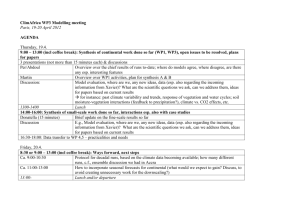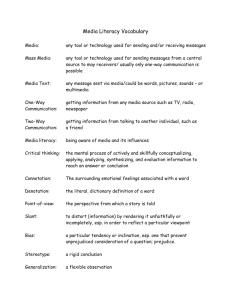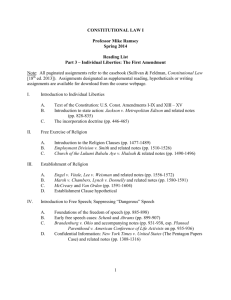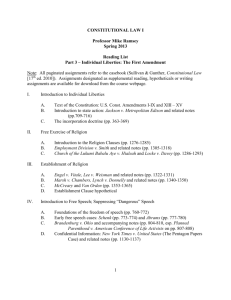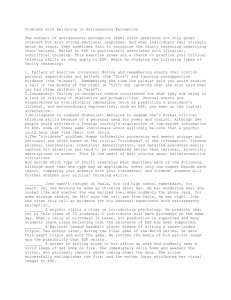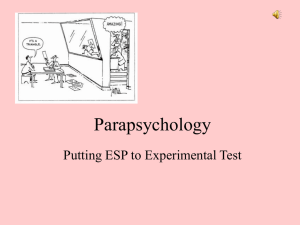WHAT IS ESP? THE DEVELOPMENT OF ESP ESP: APPROACH NOT PRODUCT
advertisement
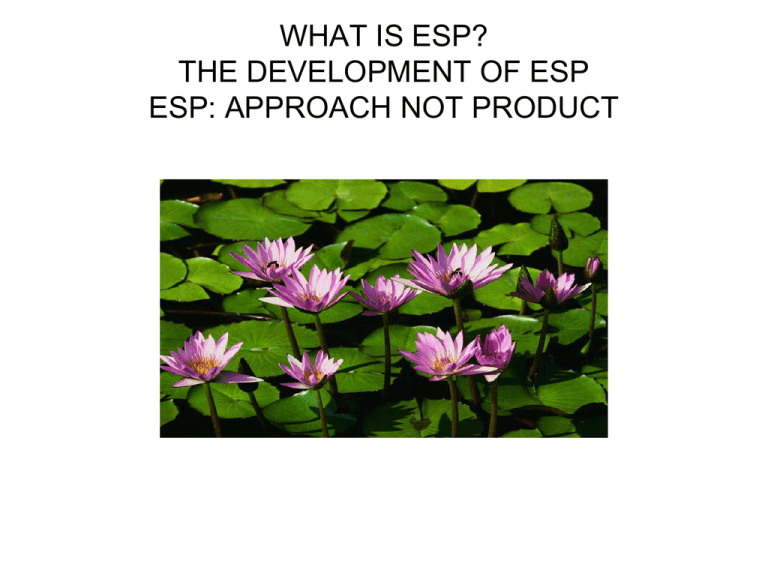
WHAT IS ESP? THE DEVELOPMENT OF ESP ESP: APPROACH NOT PRODUCT The concept of special language: register analysis • This concept departed from the principle that English of a specific science differs from each other in terms of its grammatical and lexical features of the registers. • Register analyses in ESP was tailored for the pedagogic purpose, i.e. making the ESP course more relevant to learners’ needs, not intended for the purpose to discuss the nature of registers of English per se. • The main purpose of an ESP course was to produce a syllabus which gave a high priority to the language forms students would meet in their field and in turn would give low priority to forms they would not meet. Beyond the sentence: rhetorical or discourse analysis • Stages of ESP development: 1st stage focused on language at the sentence level, 2nd phase shifted attention the level above the sentence (putting into play discourse or rhetorical analyses). • Thus, the main focus of register analysis is on how sentences were combined in discourse to produce meaning. • See Rhetorical Process Chart on page 11. Target situation analysis • Target situation analysis = taking the existing knowledge and setting it on a more scientific basis by establishing procedures for relating language analysis more closely to learners’ reasons for learning. • An ESP course is geared to a purpose with which learners enable to function adequately in a target situation (situations in work fields). • This starting point leads to conducting ‘Needs Analysis’ (the target situation analysis) for designing the ESP course syllabus, that is done through 2 steps: identifying the target situation and analysing the linguistic features of the situation. Skills and Strategies • The first and second stages of the ESP development still did not alter the surface linguistic features of the target situation analysis. • The next stage introduced the skills-centered approach that promotes common reasoning and interpreting processes so as to enable learners to extract meaning from discourse. • Hence, the focus is not solely on the surface forms of the language. The focus is rather on the interpretative strategies, for example, guessing the meaning of words from context, using visual layout to determine the type of text. A learning-centered approach • The concerns in register analysis and interpretative strategies as in the skills and strategies approach are actually directed to the same destination, i.e. language use. • This is anyhow not the main concern of ESP since describing and exemplifying what people do with language will not automatically enable someone to learn it. • Therefore, a valid approach to ESP must be based on an understanding of the processes of language learning. ESP: approach not product • The successive stages of ESP have emphasized language-centered approaches. • What is ESP? It correlates to a context which will show how ESP at the present time relates to the rest of ELT. • See the tree of ELT. ESP is divided into its two main branches: EAP (English for Academic Purposes) and EOP/EVP/VESL (English for Occupational Purposes/English for Vocational Purposes/Vocational English as a Second Language). • The next level depicts the three categories of ESP: EST (English for Science and Technology), EBE (English for Business and Economics) and ESS (English for the Social Sciences). What ESP isn’t • ESP is not a matter of teaching ‘specialised varieties’ of English. • ESP is not just a matter of Science words and grammar for Scientists, Hotel words and grammar for Hotel staff and so on. (It involves the range of knowledge and abilities which enable people to do with language) • ESP is not different in kind from any other form of language teaching. No such thing as an ESP methodology. • So, what is ESP? ESP is an approach to language teaching in which all decisions as to content and method are based on the learner’s reason for learning. Points for Discussion • Which of the stages of ESP development has our country experienced? Has it developed in a completely different way? • Why do you think EST has set the trends in the development of ESP? • Could you give a few more examples of ESP courses on the top branches of the ELT tree? • What differences would you expect to find between an EOP course and an EAP course for doctors? In what ways do you think occupational and academic needs differ? • All language teaching should be based on learner needs. Thus in theory there is no difference between ESP and General English teaching; in practice, however, there is a great deal of difference. How far would you agree with this statement? What differences, either in theory or in practice do you think there are?



